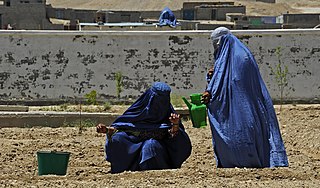 W
WWomen's roles in agriculture in Afghanistan have been shaped by the cultural landscape of the country. Women comprise nearly half of the farming and agricultural workforce in Afghanistan. In recent years, women have been contributing to farm work and been earning money or barter goods for their contributions.
 W
WDoreen Rose Braitling was a pioneering pastoralist and heritage advocate of Central Australia. After moving from Mount Doreen Station to Alice Springs in 1959, Braitling became involved in the preservation of the town’s historic buildings through the National Trust of the Northern Territory Inc. She was often called upon to give talks on the history of Central Australia, which were broadcast on radio. She was also known for writing stories and poetry.
 W
WHarriette Eliza Cushman (1890–1978) was the first female Extension Service poultry specialist in the United States, a lifelong supporter of the arts, an environmental advocate, and an honorary member of the Blackfoot tribe.
 W
WWomen have always been active in agriculture in Japan. Women farmers have, throughout Japan's history, outnumbered male farmers. Traditionally, women farmers in Japan did farm work and cared for other members of the family. Some held part-time jobs and then came home to do farm work. Most farmland in Japan is used by small family farms, though other types of agricultural collectives are appearing in the country. The Japanese government has been active in encouraging women to go into agriculture in the early 21st century.
 W
WLee Toy Kim better known as Granny Lum Loy or Lu Moo was a renowned Chinese businesswoman in Darwin in the Northern Territory of Australia.
 W
WWomen have historically played minor roles as farm owners in agriculture in the United Kingdom, but the number who own or lease farms is rising rapidly in the 21st century. In 2008 there were 13,000; by 2014 there were 23,000.
 W
WWomen in agriculture in China make up a diverse group of women who support agricultural activities in their country. Because China is a large country, rural women should not be considered a monolithic group, but instead have different strategies for success based on group or family relationships.